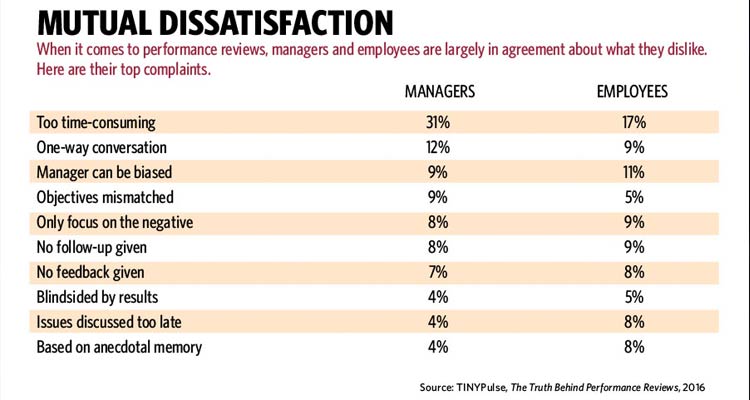The New Rules of Performance Reviews
Over the last few years, the business press has churned out headlines announcing that the performance review, that reliable and just as reliably hated corporate rite, was going extinct. The narrative gained momentum as corporate giants such as General Electric and Microsoft abandoned the practice, citing a range of ways in which traditional reviews fail to meet expectations. Harvard Business Review, Fast Company and even The New Yorker weighed in, critiquing everything from their waste of paperwork to their pointlessness—even, possibly, their implicit sexism. The Washington Post referred to employee appraisals as “corporate kabuki,” noting they can dull brain activity.
When corporate giant Accenture announced in 2015 that it would abolish annual reviews for its 330,000 global employees, news coverage hit a fever pitch. In writing about the professional services giant’s decision, many media outlets pointed to a compelling stat: In 2015, research by CEB Inc. found that 6 percent of the United States’ 500 largest companies had re-evaluated their performance appraisal processes.
Turns out, the prognosticators were half right. Rote annual evaluations have continued to disappear from the corporate landscape—but most companies have retained some semblance of a regular and formal review process. Structured appraisals, after all, play an integral role in establishing open communication between employees and managers. They can offer workers much-needed clarity and direction.
“Everyone hates the old model of the once-a-year exercise,” says Peter Cappelli, a professor of management and director of the Center for Human Resources at the The Wharton School at the University of Pennsylvania. “Just getting rid of them makes supervisors and subordinates happy. But if we could actually have conversations that were helpful, that would be even better.”

Sam Culbert, a professor at UCLA’s Anderson School of Management and author of the books Get Rid of the Performance Review! and Good People, Bad Managers, believes annual reviews should be jettisoned—period. “Immediately you do away with intimidation and make it more possible for employees to honestly tell bosses how they can improve their management behavior,” he says. “Employees always take feedback and try to do better. With performance reviews managers seldom hear what employees candidly think.”After three decades of studying management practices, Mr. Culbert believes enlightened companies have to end the pretense that employees can improve on anything the manager sees as lacking. What is required, he says, is other-directed focus that sizes up employees correctly, as well as manager/employee teamwork where people can candidly say what they actually think and work collaboratively to get the company the results it needs. “It’s ridiculous to think that managers are doing a good job when the people they’ve chosen and are mandated to help accomplish and succeed are failing,” Mr. Culbert says.
“We had this epiphany and got rid of employee reviews. But did we help managers make the transition away from the control they exerted via reviews?” Mr. Culbert asks. “No. Managers still have the same needs, and they need support in acquiring new ways of getting things done. The first thing they need to learn is what their old ways were costing their relationships and how a dominating relationship negatively affects results.”
A New Mentality
So how should an enlightened company dispose of the worst aspects of traditional performance reviews while enhancing the valuable bits?
First and foremost, reviews need to occur more frequently to become effective.
Old-school annual appraisals “were trying to hold people accountable for last year’s performance, improve performance going forward and also help plan their career,” Mr. Cappelli says. In reality, most companies focused on just the first goal during reviews. “A consequence was that it became very difficult to improve performance.” Accenture recognized this problem: When the company ditched once-a-year evaluations, it also committed to providing timely feedback after assignments were completed.
To maintain this forward-thinking mentality, Mr. Culbert cites another necessary shift: Link individual performance goals to desired corporate results. By focusing on the true end goal—company performance—evaluations become more straightforward and helpful. He also recommends combining manager and employee goals so that everyone thinks more broadly about results and feels that they are “in it together.” This extends to awarding bonuses based on group results instead of individual efforts. Doing so flips the switch on the superior/subordinate relationship, making it collaborative rather than adversarial. Mr. Culbert points to frequent check-ins between managers and employees as valuable tools for helping organizations move from what he calls a backward-looking “how did you screw up?” perspective to a future-oriented “how do we work together to get the results we need?” mindset. Companies should view the feedback process as a rolling “preview” of what is to come rather than a point-the-finger, fault-finding “review” of what has gone wrong. “The opportunity is to realistically learn what help the operative, given their imperfections and faulty thinking, needed that he or she didn’t get,” he says. “Then it’s lessons learned, not punishment and negative consequences, for exacting accountability. The employee needs to learn how to do what previously he or she did not, and the manager needs to learn how to perform the missing oversight so that better results are assured. If the learning is surface or insufficient, then either ambitions or people need to be replaced.”
“With performance reviews managers seldom hear what employees candidly think.”
—Sam Culbert, professor, UCLA Anderson School of Management
A less conflictive work environment can produce very real improvements, according to brain researchers. David Rock, co-founder and CEO of the New York-based NeuroLeadership Institute, points out that labeling people with a rating or ranking immediately generates a fight-or-flight response that restricts creativity and makes someone inclined to ignore or push back against feedback. And the traditional, oppositional review structure reflects an outdated understanding of human learning that has been debunked by Stanford University psychology professor Carol Dweck. (Her “growth mindset” research shows the power of praising effort and persistence, rather than innate skills and intelligence.)
The traditional review process reinforces the wrong idea: that people’s abilities are predetermined, or what Ms. Dweck calls “fixed mindset.” A collaborative process, meanwhile, helps to propagate a growth framework among employees, fostering the idea that people can continuously learn, grow and improve. When employees believe they can grow, they can work through any negative, fixed ideas they might have about themselves and bring a higher-performance mentality to everything they do.
Necessary Changes
Implementing fundamental shifts in how managers and employees relate to each other and think about their work is tough, of course. Many companies, even those that acknowledge that the review framework is broken, struggle to break the connection between an annual five-tiered ranking system and matching pay increases.
“Some of it is ideology: We believe employees are motivated by merit pay, even though it’s trivial,” Mr. Cappelli says. “Some of it is just change management: It’s hard to move to a new model, and lots of policies now are built around the annual appraisal.” Mr. Culbert also notes that the C-suite’s commitment to a culture shift is essential: Unless the very highest-ranking leaders make a serious commitment to changing the management mentality, nothing will happen.
To truly improve the review process, companies need to ditch the “what have you done for me today?” mentality. Bonuses derived from an employee’s performance in the past year are based on an input-output model. This can be pernicious: It causes leaders to overlook actions that could lead to long-term payoffs. To develop talent in a more meaningful way, managers must think about the arc of a person’s desired career and corporate goals.
Similarly, modern corporate expectations of objectivity and accountability in performance evaluations also need to be reworked if a better review system is to take root. Every human being has his or her own set of self-interests and biases. Rather than creating the “massive amounts of pretense” required to fake total objectivity, Mr. Culbert recommends that in addition to acknowledging company interests, managers acknowledge both their own interests and those of their workers, as it leads to clearer objectives.
When it comes to accountability, no one denies that consequences must follow missed expectations. But if a company uses only punishment to create accountability, such as a denied raise or bonus, workers will not own up to mistakes. Even worse, they might conduct bad business practices to make up for it. Mr. Culbert points to the Wells Fargo debacle: When bank employees faced punishment for not opening enough new accounts, they began creating fraudulent ones to meet sales goals and maintain the corporate peace.
What corporations need to shift to is a “lessons learned” form of accountability, he says. Instead of merely punishing an underperformer, a manager needs to help the individual examine the assumptions, motivations and circumstances that led to the problem. The foundation of this new mindset must be a focus on others rather than self. Good management is inherently other-directed. But managers cannot be expected to focus on their employees’ concerns if they themselves feel insecure because they have lost the power associated with traditional reviews. Company leadership, then, must show managers that they understand the new system will not create the same tidy, tangible (and pointless) results as the old review system. Leadership can do this by acknowledging the value of effort and contribution. That requires asking managers to outline their own accomplishments and the specific ways in which they helped their workers achieve success, too.
The bottom line: To effectively shift the performance review paradigm, a company’s management team must commit to rigorous and authentic inquiry. “Bullshit is the communication etiquette of choice at most companies,” Mr. Culbert says. “But we also know that most people who go to work try to do good.” He and Mr. Cappelli agree that changing the system to increase authenticity and openness will not be easy. But it will be worth it.




